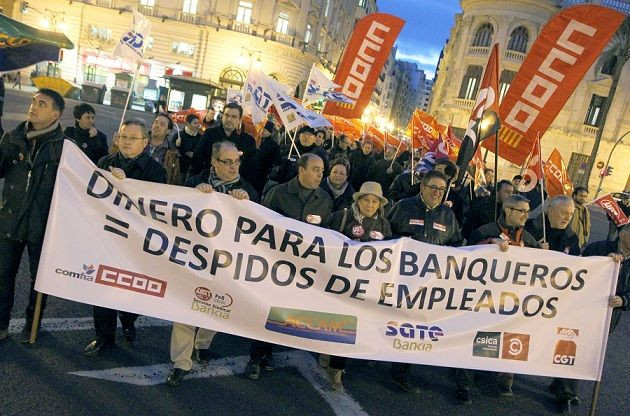Spanish Economy Sinks Further Into Recession, Q4 GDP Down 0.6% Quarterly: Bank of Spain

Spain's central bank said a recession in the euro zone's fourth-largest economy deepened in the last quarter of 2012 after Prime Minister Mariano Rajoy’s government in late September approved its fifth austerity package in a year to head off tougher conditions demanded as part of a potential European bailout.
In the first estimate of fourth-quarter economic performance, the Bank of Spain said the economy contracted 1.7 percent compared with the same period a year ago and likely contracted 0.6 percent from the previous quarter.
If confirmed by official figures to be released in a week’s time, the Bank of Spain’s initial estimate would be the weakest outturn since the second quarter of 2009. It would also be the fifth consecutive quarterly contraction and would leave gross domestic product down by 1.3 percent in 2012 as a whole.
The 0.6 percent contraction in Spanish GDP in the fourth quarter of last year “serves as a timely reminder that, while market pressures on the country have abated in response to the European Central Bank’s promised intervention, the underlying economic outlook remains extremely weak,” Jonathan Loynes, chief European economist at Capital Economics, said in a note to clients.
The Bank of Spain does not provide any breakdown, but it appears very likely that the fourth-quarter contraction was driven by a further sharp fall in household spending. Retail sales contracted in October and November, and unemployment surged to new highs. Meanwhile, the European Commission’s measure of consumer confidence dropped to a near four-year low in December.
"This budget consolidation effort has had a net contracting effect on activity throughout the year, especially in the last few months," the central bank said Wednesday. This year, meeting even stricter austerity targets "will require an additional, very ambitious fiscal effort by the central and regional governments."
Spain’s financing costs have dropped by more than 2 percentage points on its 10-year benchmark since the height of the euro zone debt crisis in July last year and after the European Central Bank pledged to do every necessary to save the euro.
On Tuesday, Spain raised €7 billion ($9.34 billion) through a successful bond sale. It was the first sale of a 10-year bond since 2011 and showed an improvement in investor sentiment. The 10-year bond was yielding around 5.066 percent on Wednesday.
Rajoy is seeking to avoid a full bailout, but Loynes noted that it remains to be seen for how long the period of market calm will last. The euro-zone crisis has been characterized by frequent large swings in market sentiment.
“While the latest bout of optimism has lasted longer than some others, we still suspect that it is only a matter of time before the markets start to ratchet up the pressure on the ECB to back up its words with actions,” Loynes said. “The risk of disappointment is high.”
Looking ahead, there are few signs that Spain’s economic performance is about to improve markedly. “All of this supports our view that Spain will sooner or later have to give in to the inevitable and request a support program in order to trigger the ECB’s bond purchase program. But even that won’t address the country’s deep-seated problems of sky-high unemployment, crippling levels of debt and a fundamental lack of competitiveness,” Loynes said.
© Copyright IBTimes 2024. All rights reserved.






















